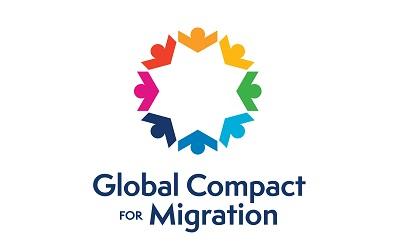Day 244, Year of #Mygration: Global Compact for Migration

Dr Fidèle Mutwarasibo, Visiting Research Fellow in the OU's Centre for Voluntary Sector Leadership, discusses the Intergovernmental conference on the Global Compact for Migration taking place in Morocco which yesterday, saw the signing of a non-binding agreement on managing migration in the world. We previously highlighted how a group of Open University academics gave evidence and fed into the development of the Global Compact. The conference concludes its proceedings today.
After yesterday's 70th anniversary of the Universal Declaration of Human Rights, it is ironic that some of the resistance to the adoption of the Global Compact for Migration stems from the fact that it uses human rights terminology. In addition, the resistance in some countries is motivated by the fact that their political elites don’t want to be seen to be “weak” on immigration. Migration is a big challenge that can be ignored or just dealt with as a security issue. Migrants are human being, after all, their experiences affect us all. We can’t ignore them, just because they have no nation-state to defend and uphold their human rights.
Today over 258 million people are migrants living outside their countries of birth. If they were all citizens of a nation state, their nation would be the fifth largest nation based on population between Indonesia (over 266 million) and Brazil (over 220 million). Without a doubt, a country with such population size would be knocking on the United Nations’ door looking for a seat on the United Nations Security Council. The migrant population is going to increase due to the forces of globalisation and other pull and push factors. Over the last 12 months, these factors have been subject of discussion on this platform.
Moreover, this is just hypothetical. Migration continues to be a political issue in sending, transit and receiving countries. As we were marking International Human Rights Day yesterday, an essential event in the context of human rights and migration was taking place in Morocco. The two-day conference ends today.
The global compact comprises 23 objectives for better managing migration at local, national, regional and global levels. These objectives are:
- Collect and utilise accurate and disaggregated data as a basis for evidence-based policies
- Minimise the adverse drivers and structural factors that compel people to leave their country of origin
- Provide accurate and timely information at all stages of migration
- Ensure that all migrants have proof of legal identity and adequate documentation
- Enhance availability and flexibility of pathways for regular migration
- Facilitate fair and ethical recruitment and safeguard conditions that ensure decent work
- Address and reduce vulnerabilities in migration
- Save lives and establish coordinated international efforts on missing migrants
- Strengthen the transnational response to smuggling of migrants
- Prevent, combat and eradicate trafficking in persons in the context of international migration
- Manage borders in an integrated, secure and coordinated manner
- Strengthen certainty and predictability in migration procedures for appropriate screening, assessment and referral
- Use migration detention only as a measure of last resort and work towards alternatives
- Enhance consular protection, assistance and cooperation throughout the migration cycle
- Provide access to basic services for migrants
- Empower migrants and societies to realise full inclusion and social cohesion
- Eliminate all forms of discrimination and promote evidence-based public discourse to shape perceptions of migration
- Invest in skills development and facilitate mutual recognition of skills, qualifications and competencies
- Create conditions for migrants and diasporas to contribute to sustainable development in all countries fully
- Promote faster, safer and cheaper transfer of remittances and foster financial inclusion of migrants
- Cooperate in facilitating safe and dignified return and readmission, as well as sustainable reintegration
- Establish mechanisms for the portability of social security entitlements and earned benefits
- Strengthen international cooperation and global partnerships for safe, orderly and regular migration
In a nutshell, the Global Compact for Migration:
-
aims to mitigate the adverse drivers and structural factors that hinder people from building and maintaining sustainable livelihoods in their countries of origin;
-
intends to reduce the risks and vulnerabilities migrants face at different stages of migration by respecting, protecting and fulfilling their human rights and providing them with care and assistance;
-
seeks to address the legitimate concerns of states and communities, while recognising that societies are undergoing demographic, economic, social and environmental changes at different scales that may have implications for and result from migration;
-
strives to create conducive conditions that enable all migrants to enrich our societies through their human, economic and social capacities, and thus facilitate their contributions to sustainable development at the local, national, regional and global levels.
In an article published last week by Marcia Vera Espinoza, a Lecturer in Human Geography at Queen Mary University of London, Leila Hadj-Abdou, a Research Fellow in the Migration Policy Centre at the European University Institute and Leiza Brumat, also a Research Fellow in the Migration Policy Centre at the European University Institute, the number of countries opposing the pact was increasing almost daily. The Dominican Republic was one of the countries to join "Australia, Austria, Bulgaria, Israel, Poland, the Czech Republic and Slovakia in refusing to sign the document that they negotiated for 18 months... The US quit negotiations early on, in December 2017, and was followed by Hungary seven months later”.
So why were so many countries opposed? The authors highlighted the following reasons:
- First, states with a restrictive migration agenda, such as Hungary, consider the symbolic act of approving the GCM as a sign that they are promoting migration. The regulation of migration is not only seen as a matter of laws, policies, and “border walls”, but also as a matter of communication. Some officials believe that if a country is perceived to be open towards immigration, it is providing incentives for migration, whereas harsh rhetoric is seen as a deterrent.
-
Second, while state officials are well aware that the GCM is non-binding, those that have rejected it fear it will turn into common practice or even common law. In turn, advocates of the GCM have underlined that this is an inaccurate view. Its potential, though, lies somewhere in between. Some of our interviewees pointed out that, while not legally binding, it should be a politically guiding framework, which sets out ground rules for the long term.
-
Third, some states that have rejected the GCM are especially worried about human rights references within the document. In their view, an emphasis on human rights contradicts what matters for them: securing borders.
-
Fourth, hostility to the GCM mirrors the growing influence of new far-right movements, especially in countries where radical right parties are in power or are prominent. Ideas and myths about the GCM that circulated on extreme right social media sites are said to have influenced Austria’s decision to withdraw.
The migration phenomenon is not going to disappear just because there is no consensus on how to manage it. Behind the numbers, there are people whose experiences can't be ignored. The Global Compact for Migration is just an attempt for the nations to get their act together in coordinating migration and curtailing the chaos that enables human traffickers’ businesses to flourish. There is no doubt that the dialogue is going to continue, and one would hope that one day, we will have a rational migrant centred debate on migration. Before we cross that bridge, there is no doubt that the politics of migration will continue to be driven by fear of the stranger.
Quarterly Review of Research
Read our Quarterly Review of Research to learn about our latest quality academic output.

Contact our news team
For all out of hours enquiries, please telephone +44 (0)7901 515891
Contact detailsNews & articles

What will education look like in a fairer, greener future- and how do we get there?
As we approach 2030, the clock is ticking on the world’s promise to deliver Sustainable Development Goal 4: inclusive, equitable, and quality education for all. Yet for many educators and policymakers, global education still feels like an abstract or secondary concern - something for others, somewhere else.